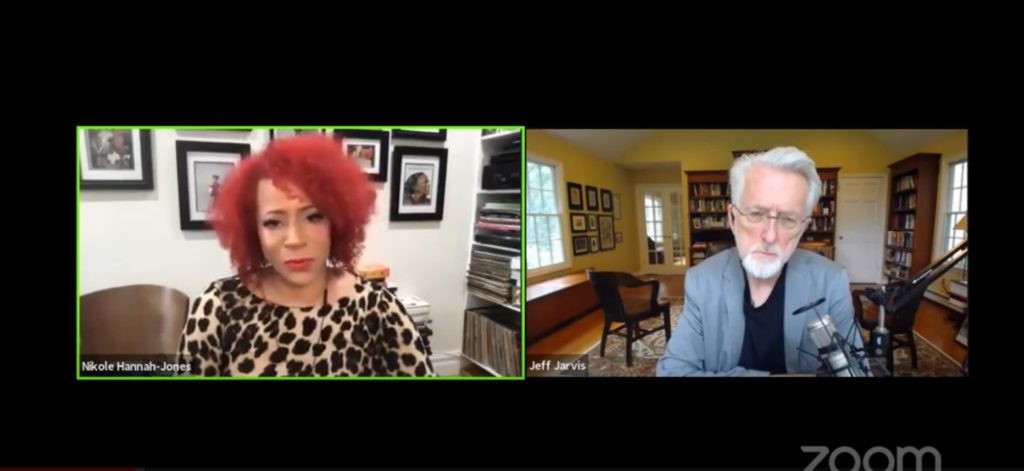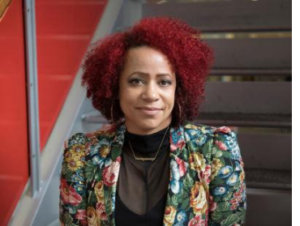Just like any other industry, journalism must also come to a reckoning with its role in the institution of slavery, said said New York Times Magazine reporter Nikole Hannah-Jones, during her ISOJ keynote session, “Covering race from 1619-present.”
“There are so many industries that were entangled in the institution of slavery, even though we have been taught to think that the only people who benefited or bare any responsibility for slavery are people who actually owned human beings, but of course we know that is not the case,” she said.
In a July 23 conversation with moderator Jeff Jarvis, director of the Tow-Knight Center for Entrepreneurial Journalism at CUNY’s Craig Newmark Graduate School of Journalism, Hannah-Jones spoke about her Pulitzer Prize-winning 1619 Project, the obstacles journalists of color face in the industry, and her advice to journalism students of color and mentors.

Nikole Hannah-Jones and Jeff Jarvis during ISOJ.
It is necessary, she said, for journalists, regardless of their beat, to write about racial inequality. To not do so, she said, would be to ignore the lived experience of Black communities and other communities of color.
With the publishing of The 1619 Project, which examined the institution of slavery in the United States, Hannah-Jones said she felt a heavy responsibility because she knew if her work failed it might end up closing the doors to Black journalists and other journalists of color who would want to undertake similar projects. Since the 1619 Project was published, Hannah-Jones has partnered up with Oprah Winfrey and Lionsgate to adapt the project into a TV series, documentary films and more. She has also signed a multi book deal with Penguin Random House, which is set to come out in Fall 2021.
When asked how she handles the psychological weight of having right-wing media try and discredit her and her work, she said that is not something she spends a lot of time thinking about.

Nikole Hannah-Jones
“I have a power to write about things on the biggest platform in the world in a way that can change the national conversation,” she said. “I try to funnel it into more work and try to use what privilege I have for the benefit of my people.”
When asked by Jarvis what reparations would look like in journalism, Hannah-Jones said it was a question she would like to think more about, yet offered the response that reparations had to be monetary and needed to go beyond the renaming of a building or the hiring of more journalists of color. As an industry, journalism has done badly in hiring Black journalists and retaining that talent.
“Industries are looking for small levels of racial diversity but they want phenotype diversity,” she said. “They want people who are racially different but ideologically the same.”
She spoke about her experience at The Oregonian, where she worked for six years, during which time she said she was thinking of leaving the industry all together. It’s a common experience for Black, Latino and indigenous journalists who get into the newsroom and are driven out.
“Our industry is based on transparency and accountability… we refuse to be accountable and transparent ourselves about who we hire. I think it’s so hypocritical…” she said. “It’s a scorn on our industry that we refuse to be transparent on those things.”
On the topic of what advice she would give journalists of color starting out, Hannah-Jones said it’s challenging work and that it takes a lot of effort to find editors to accept the stories you pitch. Offering advice, Hannah-Jones said she would analyze editors’ decisions and then rework her pitch to turn it into something that would get approval.
“Find a mentor somewhere who can help open doors from you and guide you. You have to find people that open doors,” she said.
Mentors are also key in nurturing aspiring journalists. They shouldn’t “presume that silence [from student journalists] is disinterest,” especially when it comes to first-generation students who come from communities that have been marginalized, Hannah-Jones said.

Jeff Jarvis
Jarvis followed up on this saying: “Be aware of their imposter syndrome and that you are the cure for that as their mentor. There’s a bias to silence.”
When asked if she considers herself an educator, Hannah-Jones answered that teaching is built into her writing since she is telling readers the whys and hows and providing context for decisions going years back. The element of education, she added, provides understanding and therefore the empathy to want to do something about injustice.
“There are a lot of wrongs in this world and I want my journalism to help right them,” Hannah-Jones said. “Not only do I write and try to educate through my writing, I teach all over the country about the things I write about. In that way, I hope my journalism is educational.”
To watch the full session, click here.